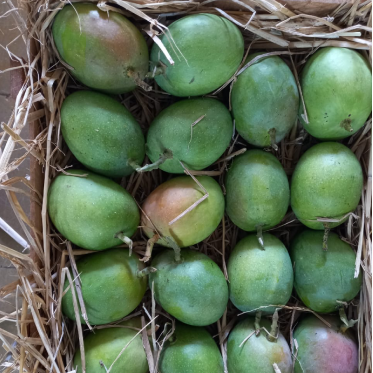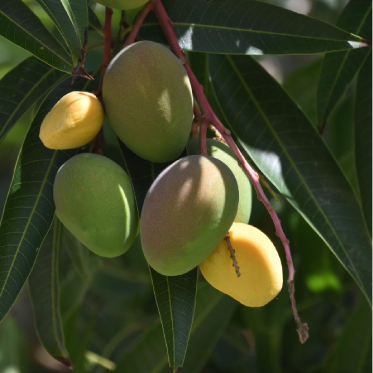Natural or carbide-free ripening of Alphonso mangoes is preferred for several health, quality, regulatory, and environmental reasons. Here’s a detailed explanation:
- Health Reasons
Avoiding Harmful Chemicals:
- Calcium Carbide Risks:
- Calcium carbide, often used illegally for artificial ripening, contains impurities like arsenic and phosphorous, which are hazardous to health.
- Residual chemicals can cause respiratory issues, neurological problems, and gastrointestinal disturbances.
- Food Safety Concerns:
- Carbide-ripened fruits may not meet food safety standards, posing risks to consumers.
Ethylene is Safer:
- Natural ripening using ethylene gas (a natural plant hormone) is safe, non-toxic, and approved by food safety authorities like FSSAI (India), USDA (USA), and EFSA (EU).
- Quality of Mangoes
Improved Flavor and Aroma:
- Naturally ripened mangoes develop their characteristic sweetness, aroma, and rich flavor gradually.
- Carbide-ripened mangoes often taste bland and lack the natural Alphonso flavor profile.
Better Texture:
- Natural ripening allows uniform softening, giving Alphonso mangoes their smooth, buttery texture.
- Carbide use can result in uneven ripening, with some parts of the fruit remaining unripe while others become overripe.
Enhanced Color Development:
- Naturally ripened Alphonso mangoes achieve their characteristic golden-yellow color with a natural blush.
- Carbide ripening often leads to patchy, artificial-looking skin with poor visual appeal.
- Compliance with Regulations
- Legal Restrictions:
- The use of calcium carbide for ripening is banned in many countries, including India, under the Prevention of Food Adulteration Act.
- Regulatory agencies like FSSAI advocate for safer, natural ripening methods.
- Export Standards:
- Export markets, particularly the USA, EU, and Japan, require adherence to strict quality and safety standards. Natural ripening ensures compliance, enabling wider market access.
- Consumer Demand and Market Preference
- Consumer Awareness:
- Growing awareness about the harmful effects of carbide-ripened fruits has increased demand for naturally ripened mangoes.
- Premium Pricing:
- Naturally ripened Alphonso mangoes are seen as higher-quality products, allowing farmers and sellers to command better prices.
- Environmental and Ethical Concerns
- Eco-Friendly Practices:
- Natural ripening methods, such as using controlled ethylene gas or traditional straw ripening, are environmentally friendly and reduce chemical pollution.
- Sustainability:
- Promoting natural ripening supports sustainable farming practices, benefiting farmers and consumers alike.
- Methods of Natural Ripening
Traditional Ripening:
- Stacking mangoes with hay or straw in a well-ventilated room to allow natural ethylene production by the fruit itself.
Controlled Ripening Chambers:
- Using ethylene gas (100–150 ppm) in ripening chambers with controlled temperature (18–24°C) and humidity (85–90%).
- Ensures uniform and safe ripening without compromising on quality or safety.










